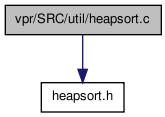vpr/SRC/util/heapsort.c File Reference
#include "heapsort.h" Include dependency graph for heapsort.c:
Include dependency graph for heapsort.c:Go to the source code of this file.
Functions | |
| static void | add_to_sort_heap (int *heap, float *sort_values, int index, int heap_tail) |
| static int | get_top_of_heap_index (int *heap, float *sort_values, int heap_tail, int start_index) |
| void | heapsort (int *sort_index, float *sort_values, int nelem, int start_index) |
Function Documentation
| static void add_to_sort_heap | ( | int * | heap, |
| float * | sort_values, | ||
| int | index, | ||
| int | heap_tail | ||
| ) | [static] |
Adds element index, with value = sort_values[index] to the heap. Heap_tail is the number of elements in the heap *after* the insert.
Definition at line 55 of file heapsort.c.
{
unsigned int ifrom, ito; /* Making these unsigned helps compiler opts. */
int temp;
heap[heap_tail] = index;
ifrom = heap_tail;
ito = ifrom / 2;
while(ito >= 1 && sort_values[heap[ifrom]] < sort_values[heap[ito]])
{
temp = heap[ito];
heap[ito] = heap[ifrom];
heap[ifrom] = temp;
ifrom = ito;
ito = ifrom / 2;
}
}
 Here is the caller graph for this function:
Here is the caller graph for this function:| static int get_top_of_heap_index | ( | int * | heap, |
| float * | sort_values, | ||
| int | heap_tail, | ||
| int | start_index | ||
| ) | [static] |
Returns the index of the item at the top of the heap (the smallest one). It then rebuilds the heap. Heap_tail is the number of items on the heap before the top item is deleted.
Definition at line 83 of file heapsort.c.
{
int index_of_smallest, temp;
unsigned int ifrom, ito, heap_end;
index_of_smallest = heap[1];
heap[1] = heap[heap_tail];
heap_end = heap_tail - 1; /* One item deleted. */
ifrom = 1;
ito = 2 * ifrom;
while(ito <= heap_end)
{
if(sort_values[heap[ito + 1]] < sort_values[heap[ito]])
ito++;
if(sort_values[heap[ito]] > sort_values[heap[ifrom]])
break;
temp = heap[ito];
heap[ito] = heap[ifrom];
heap[ifrom] = temp;
ifrom = ito;
ito = 2 * ifrom;
}
/*index must have the start_index subracted to be consistent with the original array*/
return (index_of_smallest - start_index);
}
 Here is the caller graph for this function:
Here is the caller graph for this function:| void heapsort | ( | int * | sort_index, |
| float * | sort_values, | ||
| int | nelem, | ||
| int | start_index | ||
| ) |
This routine loads sort_index [1..nelem] with nelem values: the indices of the sort_values [1..nelem] array that lead to sort_values[index] being decreasing as one goes through sort_index. Sort_values is not changed.
Definition at line 23 of file heapsort.c.
{
int i;
sort_index-=start_index;
sort_values-=start_index;
/* Build a heap with the *smallest* element at the top. */
for(i = 1; i <= nelem; i++)
add_to_sort_heap(sort_index, sort_values, i, i);
/* Now pull items off the heap, smallest first. As the heap (in sort_index) *
* shrinks, I store the item pulled off (the smallest) in sort_index, *
* starting from the end. The heap and the stored smallest values never *
* overlap, so I get a nice sort-in-place. */
for(i = nelem; i >= 1; i--)
sort_index[i] = get_top_of_heap_index(sort_index, sort_values, i, start_index);
sort_index+=start_index;
sort_values+=start_index;
}
 Here is the call graph for this function:
Here is the call graph for this function: Here is the caller graph for this function:
Here is the caller graph for this function:




